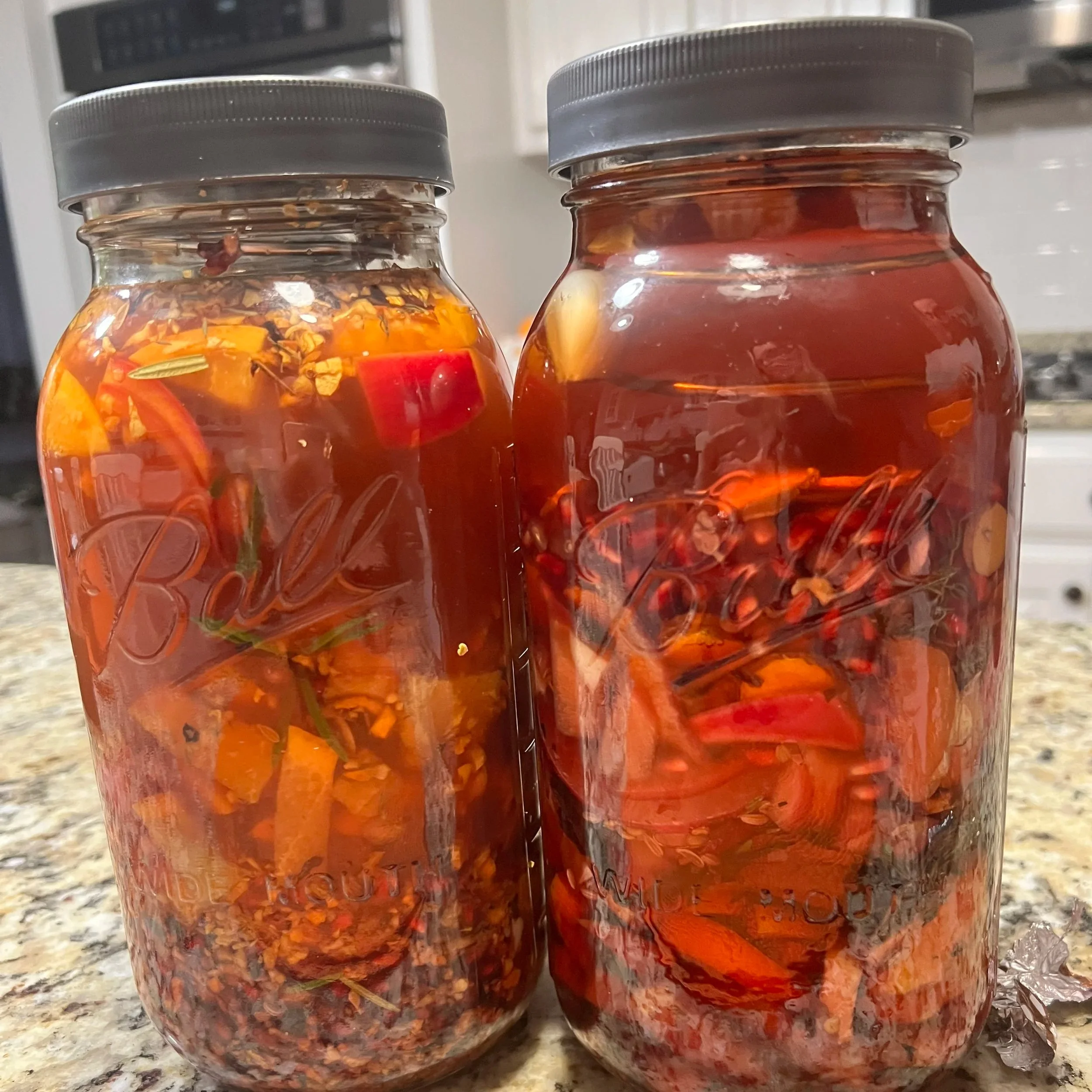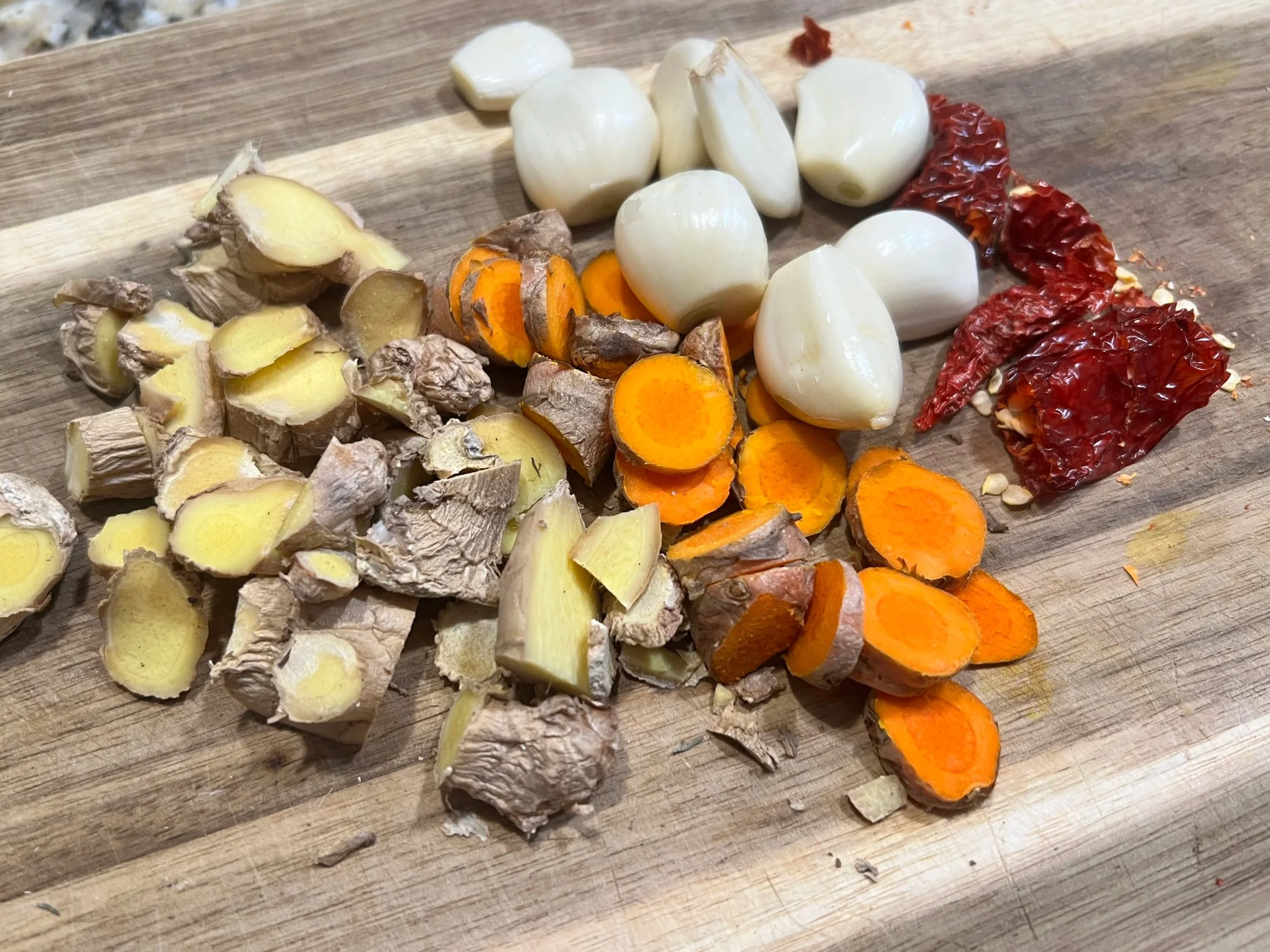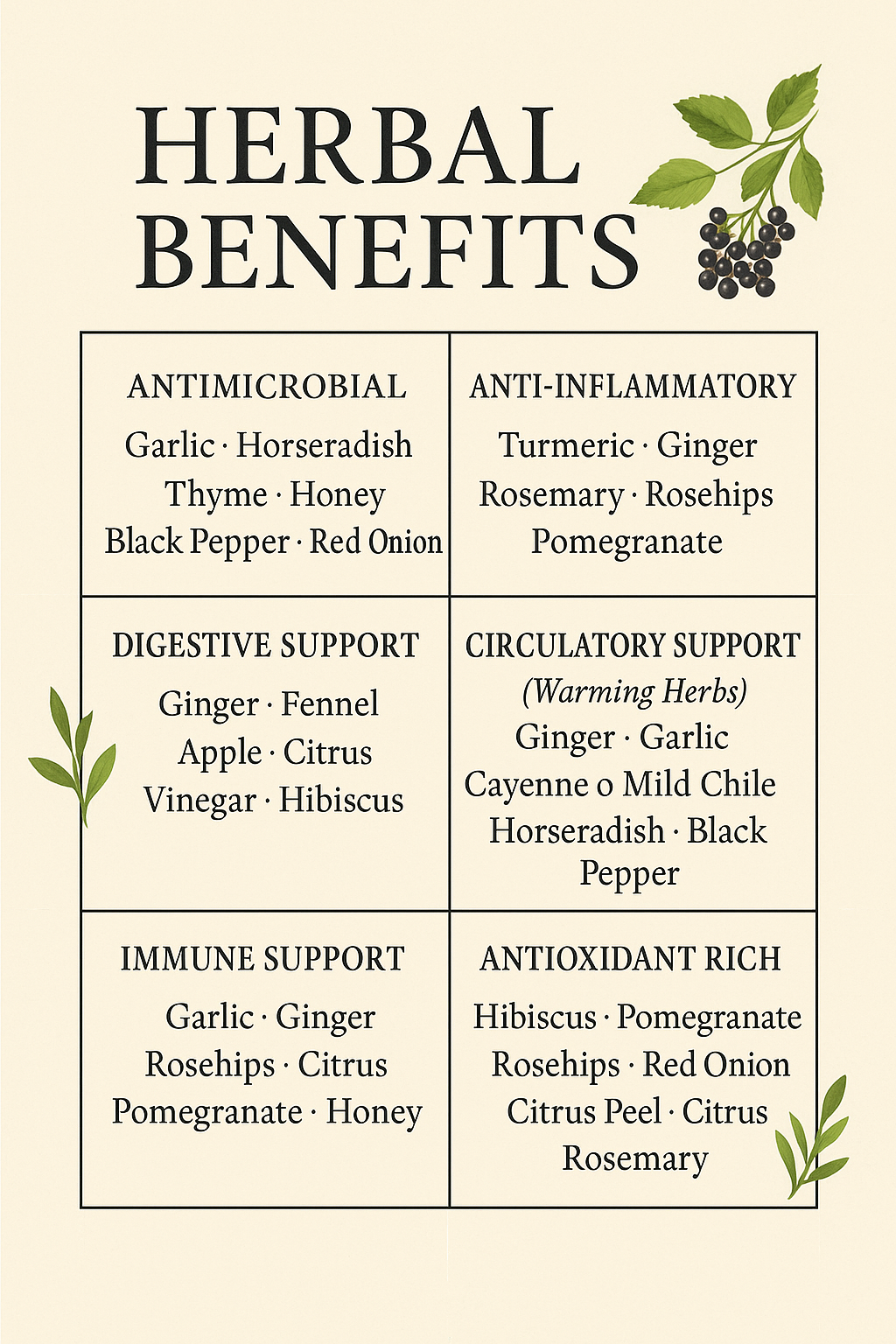🌿 Hearth & Harvest Fire Cider
Dobermanor Farms – Fruity + Herbal Farmhouse Blend
Fire cider has been a staple in herbal kitchens for generations. Here at Dobermanor Farms, we’ve crafted our own farmhouse version: a fruity, herbal blend with bright citrus, warming roots, and deep berry notes. This Hearth & Harvest blend brings together the warmth of the hearth and the abundance of the harvest season — perfectly balanced with gentle heat, uplifting aromatics, and herbal depth.
Made with:
🍊 Orange
🍎 Apple
💗 Hibiscus
🍇 Pomegranate
🌿 Rosemary + Thyme
🔥 Ginger + Horseradish
And YES — just a touch of cayenne!
This tonic is ideal for winter wellness, digestive comfort, or adding a lively splash to food and drinks.
Farmhouse Note: We’ll also be using our Hearth & Harvest Fire Cider as a homemade vinaigrette dressing for Christmas dinner. And trust me, you’ll want to save some for your holiday table.
Our Hearth & Harvest Fire Cider • Immune Boost • Herbal Wellness 🌿
🌿 The Herbal Benefits Inside Hearth & Harvest Fire Cider
Fire cider is packed with plant allies that support the body in many different ways. Here’s a closer look at the herbal magic inside every jar of Dobermanor Farms’ Hearth & Harvest Fire Cider.
Red Onion Red onions bring more than flavor. They contain quercetin, a powerful antioxidant known for supporting the immune system and helping the body respond to inflammation. Traditionally, onions have been used to open the sinuses, stimulate digestion, and encourage circulation.
Garlic Garlic is a hero of herbalism. Rich in allicin, it has well-known antimicrobial, antiviral, and immune-supporting properties. It’s warming, stimulating, and helps the body respond to colds and respiratory challenges. Fire cider allows its medicine to infuse slowly into vinegar, making it gentler and easier to take.
Ginger Ginger brings warmth, circulation, and digestive support. It helps move “cold” or stagnant conditions out of the body and supports healthy inflammation response. It’s also a classic remedy for nausea and sluggish digestion.
Turmeric Turmeric adds golden color and powerful anti-inflammatory properties. Paired with black pepper in your recipe, its active compounds are more bio-available. It helps soothe the joints, supports liver health, and brings grounding warmth to the blend.
Horseradish Horseradish is a classic fire cider ingredient for a reason. It clears the sinuses like nothing else. Traditionally, it’s been used to open the respiratory passages, improve circulation, and break up congestion. It’s stimulating, pungent, and deeply warming.
Orange Orange peel is rich in vitamin C and bitter compounds that support digestion and liver function. The fruit adds brightness and sweetness, while the peel brings aromatic oils that make this fire cider more uplifting and easier to take.
Apple Apples bring mild sweetness, quercetin, and astringency. They help round out the flavor, soften the heat, and support the digestive system. They also balance the pungent roots beautifully.
Pomegranate Pomegranate is rich in antioxidants, supporting heart health, circulation, and cellular repair. It brings a fruity acidity that marries beautifully with the vinegar and herbs, and its ruby color deepens the whole brew.
Hibiscus A cooling, vitamin-C–rich herb, hibiscus supports heart health, digestion, and hydration. Its tartness brightens the vinegar and balances the warming spices, making the fire cider smoother and more drinkable.
Rosehips Rosehips are one of nature’s most concentrated natural sources of vitamin C. They support healthy immune response, connective tissue, and skin vitality. Their mild sweetness and soft fruitiness help mellow the vinegar.
Fennel Seeds Fennel is famous for its digestive support It helps with easing gas, bloating, and sluggish digestion. It also adds a mild sweetness and reduces the intensity of the heat, bringing more balance to the blend.
Thyme Thyme is a classic respiratory herb. It is supportive to the lungs, antimicrobial, and comforting during cold season. It adds aromatic depth and reinforces the immune-supportive nature of the recipe.
Rosemary Rosemary is an uplifting herb associated with clarity, memory, and circulation. It supports the respiratory system and adds antioxidant richness. Its evergreen brightness makes this fire cider especially beautiful during the holiday season.
Black Pepper Black pepper improves circulation and enhances absorption of certain herbs, especially turmeric. It adds warmth rather than heat and helps the body better utilize the herbal constituents in the blend.
Cayenne Pepper Cayenne brings gentle warmth and circulation to the body, helping everything “move” a little better during the cold months. Even in small amounts, it supports healthy digestion by stimulating stomach juices and encouraging smoother nutrient absorption. Its warming nature also helps the body respond more efficiently to seasonal challenges, making it a classic winter herb. Cayenne has mild antimicrobial properties and enhances the effectiveness of other herbs by improving circulation, all without overwhelming the blend when used sparingly.
Apple Cider Vinegar Raw, unfiltered ACV is a traditional solvent that pulls minerals and nutrients from herbs. It supports digestion, helps maintain a healthy microbiome, and creates the perfect base for infusing roots and fruits.
Honey Honey softens the vinegar and rounds out the heat. It carries its own antimicrobial and soothing properties — especially helpful for the throat and respiratory passages. In traditional herbalism, honey is often used to deliver and harmonize herbal blends.
Ginger, turmeric, garlic, and a touch of heat — the foundation of Hearth & Harvest Fire Cider.
🌿 What does all of this mean?
(A Simple, Farm-Friendly Explanation)
👉 When we say an herb is antimicrobial, we simply mean: It helps the body deal with unwanted germs.
Microbes are tiny living things — like bacteria, viruses, or fungi. Some microbes are helpful (your gut has billions of friendly ones), but others can cause trouble like:
sniffles and colds
infections
stomach bugs
sinus issues
An antimicrobial herb supports the body by helping to:
slow down the growth of harmful germs
keep them from multiplying
support the body’s natural defenses
It does not sterilize the body or “kill everything.” Instead, it supports balance — helping the body handle germs the way it was designed to. During the winter season, when we’re indoors more…sharing air, and fighting off seasonal bugs, antimicrobial herbs help give the body the extra support it needs. They do this in gentle, natural ways: Keeping your tissues clear, encouraging healthy immune response, helping your body respond faster, and reducing the burden of unwanted microbes.
👉 When we say an herb is anti-inflammatory, we simply mean: It helps calm irritation in the body.
Inflammation is your body’s natural response to stress, injury, germs, or irritants. A little inflammation is normal. It’s the body trying to protect or repair itself.
But sometimes the body becomes overly inflamed, which can show up as:
stiffness
soreness
swelling
heat
redness
chronic aches
digestive upset
brain fog
An anti-inflammatory herb helps gently soothe that irritation. It doesn’t “shut down” your immune system, it simply encourages a calmer, more balanced response. These herbs help the body feel less “reactive” and more at ease.
👉 When we say an herb is for digestive support we simply mean: It helps your stomach and gut do their job more comfortably.
“Digestive support” refers to how an herb helps with things like:
bloating
gas
indigestion
sluggish digestion
feeling heavy after meals
occasional nausea
heartburn
irregular bowel movements
Digestive-supporting herbs can work in many ways. Some stimulate digestive juices (like ginger). Some soothe the stomach and intestines (like apple and rosehips). Some reduce gas and cramping (like fennel). Some help the liver process fats (like citrus peel). Together, these ingredients make the tonic feel good on the stomach, not harsh.
👉 When we say an herb is a circulatory stimulant we simply mean: It gently encourages blood flow so your body can warm up and function better.
A circulatory stimulant is an herb that promotes healthy blood flow. This can help:
warm cold hands and feet
encourage nutrient delivery
help the body move out stagnation
support healing
increase overall vitality
You can feel circulatory herbs in your body. It’s that warm, tingly, “coming alive” feeling. Circulatory herbs make fire cider feel invigorating, not just tangy.
👉 When we say an herb is immune-supportive we simply mean: It helps your body stay strong and respond better to germs.
Your immune system is your body’s defense team. Immune-supportive herbs don’t fight the battle for your body. Immune-supportive herbs help make the body’s natural defenses stronger and more efficient. They help the immune system do what it’s supposed to do, more effectively.
These herbs can help with:
overall resilience
seasonal changes
winter bugs
recovery
energy during illness
reducing the length or intensity of colds
Herbalism isn’t about attacking the body — it’s about supporting it so it can do what it’s made to do.
Herbal Properties & Functional Benefits of Hearth & Harvest Cider
Primary Use Guidance
Important Use Note
This fire cider is a potent, warming herbal tonic. Please start with ½–1 teaspoon, diluted in water or taken with food.
Do not take straight or in large amounts, especially on an empty stomach.
More is not necessarily better.
Sensitivity Caution
Use with care or avoid if you:
– Have a sensitive stomach, reflux, or gastritis
– Are sensitive to spicy or acidic foods
– Experience histamine sensitivity or flushing
– Are new to herbal tonics
Herbal tonics should feel supportive and warming, not overwhelming.
🌿 CULINARY USES FOR HEARTH & HARVEST FIRE CIDER
Dobermanor Farms — Farmhouse Herbal Kitchen
Here at Dobermanor Farms, we’re excited to transform our harvest into small-batch creations that have both culinary uses and medicinal value. Here are some ideas for putting our Hearth & Harvest Fire Cider to culinary use:
🍲 1. Dressings & Marinades
• Winter Herbal Vinaigrette
(Our Christmas recipe — perfect with leafy greens, nuts, dried fruit, goat cheese.)
Click HERE for the full recipe!
• Citrus-Herb Marinade for Chicken or Turkey
Mix fire cider with:
olive oil
garlic
fresh thyme
honey
a touch of mustard
Use as a 1–2 hour marinade or as a finishing drizzle.
• Roasted Vegetable Glaze
Toss roasted carrots, beets, sweet potatoes, or Brussels sprouts in:
fire cider
olive oil
a hint of maple syrup
Creates a sweet-tangy glaze that caramelizes beautifully.
• Warm Grain Bowl Dressing
Drizzle over:
quinoa
wild rice
roasted squash
pumpkin seeds
cranberries
A winter powerhouse meal.
🍛 2. Soups & Stews
• Immune-Support Splash
Add 1–2 tsp to the bowl right before serving.
Best in:
chicken soup
vegetable soup
lentil stew
chili
Adds brightness and depth.
• Decongesting “Steamer” Broth
Add to hot broth with:
ginger
lemon
a drizzle of honey
Perfect for cold-weather sniffles.
🍖 3. Meats & Proteins
• Fire Cider Chicken Skillet
Sear chicken → deglaze pan with fire cider → add broth + herbs → reduce into a bright, tangy pan sauce.
• Crockpot Pork Roast Glaze
Add ¼–½ cup to the slow cooker with apple slices and onions.
Results: fall-apart tender with a sweet-tangy finish.
• Salmon with Hearth & Harvest Drizzle
Mix fire cider + honey + mustard → brush over salmon before baking.
🍅 4. Sauces, Salsas & Condiments
• Herbal Fire Cider Ketchup
Add 1–2 tbsp to ketchup for a grown-up, tangy, spiced version.
• Chimichurri Twist
Blend with:
parsley
garlic
olive oil
pinch of red pepper
vinegar replaced PARTLY with fire cider
Gorgeous on steak, roasted veggies, or potatoes.
• Bright Holiday Cranberry Sauce
Add 1–2 tbsp after cooking cranberries.
Creates vivid flavor and herbal notes.
🥬 5. Salads & Sides
• Warm Wilted Greens
Drizzle fire cider into hot skillet with collards or kale for a tangy finish.
• Fire Cider Slaw
Mix with yogurt or mayo for a tangy slaw dressing.
• Apple + Fennel Salad
Pair with sliced apples, fennel, walnuts, and a fire cider dressing.
🍹 6. Drinks & Cocktails (YES — culinary!)
• Harvest Shrub Mocktail
Mix:
1 tbsp fire cider
sparkling water
honey
pomegranate juice
orange twist
• Fire Cider Hot Toddy Twist
Add a spoonful to a honey-lemon tea or ginger tea.
• Whisky or Bourbon Splash
Adds depth and holiday spice to an old fashioned riff.
🥘 7. Finishing Touches (This shocks people!)
• Drizzle on Roasted Potatoes or Sweet Potatoes
Just a teaspoon brightens EVERYTHING.
• Splash on Fried Eggs
A farm favorite — cuts through richness beautifully.
• Add to Beans & Greens
Southern healing food: collards + beans + fire cider = phenomenal balance.
🧂 8. Pantry Creations Using Fire Cider
• Hearth & Harvest Mustard
Mix fire cider with stone-ground mustard.
Perfect stocking stuffer for holiday baskets.
• Fire Cider Honey Butter
Whip soft butter with honey and a tiny splash of fire cider.
Use on cornbread or biscuits — unreal.
“The art of healing comes from nature, not from the physician. Therefore the physician must start from nature, with an open mind.”
🌿 A Final Note
Each ingredient plays a role in our Hearth & Harvest Fire Cider. Some warming, some cooling, some bright and fruity. But together they create a tonic that speaks to the heart of farmhouse herbalism: simple, powerful, and crafted with care.
This recipe reflects the spirit of Dobermanor Farms: rooted in tradition, guided by nature, and nurtured with love.
🌿 Sources & Further Reading
⚠️ Disclaimer
The information provided by Dobermanor Farms is for educational purposes only and is not intended as medical advice. These statements have not been evaluated by the FDA. Our products are not intended to diagnose, treat, cure, or prevent any disease.
Herbs naturally contain a variety of chemical compounds, and their potency may vary depending on how they are grown, harvested, extracted, and processed. These compounds may interact with medications or cause sensitivities in some individuals. Always consult your physician before using herbal products, especially if you are pregnant, nursing, taking medications, or have a medical condition. Discontinue use if any adverse reaction occurs.
For full details, please visit our Disclaimer & Terms of Use.




